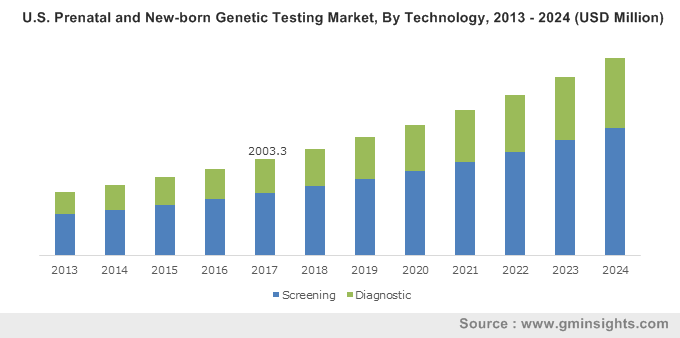Prenatal and newborn genetic testing market to register a double-digit CAGR over 2018-2024, rising awareness regarding genetic defects to add impetus to the industry growth
Publisher : Fractovia | Published Date : 2018-07-18Request Sample
Recently, the University of South Australia created ripples in prenatal and newborn genetic testing market with the introduction of a noninvasive lab-on-a-chip technology. The team of researchers at the university used a tiny microfluid device to isolate fetal cells from maternal blood cells allowing for improved genetic testing. The lab-on-chip integrates laboratory functions on a chip ranging from a few millimeters to a few square centimeters that is being further developed to detect a wide range of genetic abnormalities.
U.S. Prenatal and New-born Genetic Testing Market, By Technology, 2013 – 2024 (USD Million)

It is rather overt that such non-invasive genetic testing is a step forward from amniocentesis or taking a sample of cells from the placenta that could result in a miscarriage. In fact, the emergence of non-invasive prenatal technologies that can determine genetic abnormalities with the help of a simple blood test is becoming an inevitable part of pregnancy. Prenatal and newborn genetic testing market, driven by these changing trends, is thus gathering significant traction.
One of the reasons that prenatal and newborn genetic testing market has registered a profitable trajectory is that women are opting to become pregnant with their first child much later in life than what used to be the average first child bearing age even 50 years back. Many women now spend most their 20s earning a degree and gainful employment than starting a family. However, considering the fact that the quality of eggs in a woman declines with age, older women are more prone to conceive children with genetical defects.
Doctors are increasingly advising pregnant women over 35 years of age to undergo prenatal genetic testing to determine if the child is affected with Down Syndrome or Edward Syndrome beside a host of other genetic ailments that are common among babies born to women older than 35 years. Statistics show that the chances of giving birth to a child with Down Syndrome increases drastically after the age of 35. Besides, fetal genetics screening also helps in detecting split spine defect, cystic fibrosis and sickle cell anemia, all of which can cause physical difficulties and even death in infants. Genetic testing is thus allowing women to make a more informed decision about their pregnancies and prepare for adjustments in case their child is about to be born with special needs, thereby driving prenatal and new-born genetic testing industry outlook.
Down Syndrome is one of the most predominant genetic defects for which genetic testing is highly recommended. At present, Down syndrome accounts for more than 50% of the prenatal and newborn genetic testing market share. Children with Down Syndrome are born with heart defects and often have poor muscle tone besides other problems like high incidence of leukemia and deafness. Countries like Iceland and Denmark are known to have universal genetic screening and 100% abortion rates for Down Syndrome detected in the fetus. Genetic screening is now being hailed as a means of eradicating Down Syndrome entirely as most well-informed parents who have undertaken genetic screening to determine the health of the fetus have opted not to have a child with the challenges of Down Syndrome.
While genetic screening is catching up across major geographies, the United States dominated prenatal and newborn genetic testing market with a major share in 2017. Accounting for almost 50% of the market share in 2017, the United States is expected to emerge as a pivotal growth ground for prenatal and new-born genetic testing industry over 2018-2024. While technological advancement in the field of genetic testing has been spearheaded in the country due to investment in research and development by noted NIPT organizations like Ariosa Diagnostics (Roche), Bio-Rad, Laboratory Corporation of America, Verinata health and Sequenom, favorable reimbursement policies are also contributing toward the growth of the regional prenatal and newborn genetic testing market.
The rising awareness about the importance of genetic screening and the increase in the number of women choosing to have children later in life have added impetus to prenatal and newborn genetic testing industry. Similar trends have been observed across numerous topographies across the globe, driven by government initiatives to facilitate genetic screening and the increase in the number of medical institution and facilities providing the required technology. As medical technology continues to advance, the expansion of prenatal and newborn genetic testing market is rather inevitable. As per estimates, prenatal and new-born genetic testing industry size is expected to cross $7 billion by 2024.